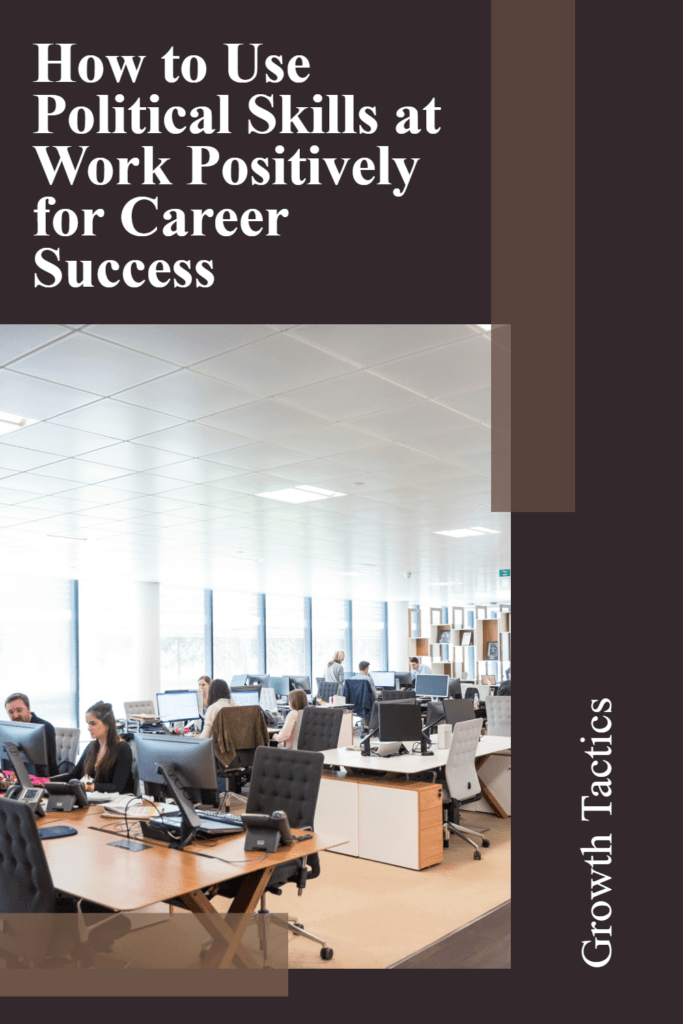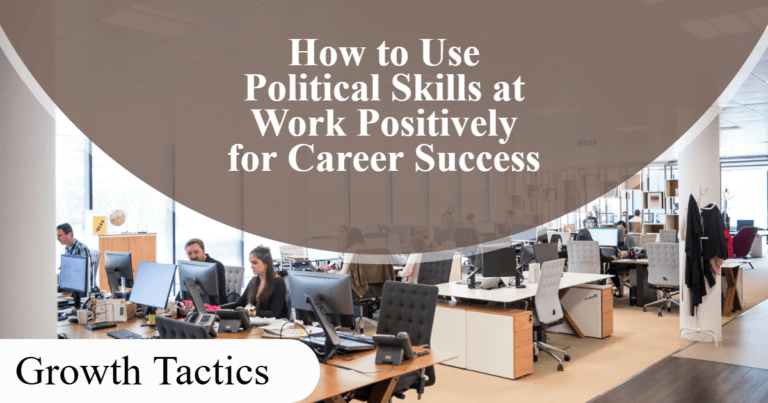Let’s face it, office politics can be tricky. I’ve been there, navigating the ups and downs of workplace relationships. But here’s the thing: understanding and using office politics is a must at times. They’re tools we can all use to boost our careers and make work better for everyone.
In my years of leadership, I’ve learned that using these skills the right way can open doors you never knew existed. So, are you ready to turn office politics into your secret weapon for success? Let’s see how you can use your political savvy to climb the career ladder while staying true to yourself.
Jump To Section
What Are Political Skills in the Workplace?
When I first started my career, I thought workplace politics was all about scheming and backstabbing. But it’s not. Workplace politics is simply how people interact and share power at work. It’s about understanding the unwritten rules and using them to get things done.
Think of it like a game of chess. You need to know how each piece moves to play well. In the office, it’s the same. You’ve got to understand how people and departments work together. It’s not about being sneaky. It’s about being smart and working well with others. Like in politics, sometimes you must do something for others to get something you want.
Key Components of Political Skill at Work
So, what makes someone politically skilled? From my experience, it boils down to a few key things:
- Social smarts: Being able to read people and situations.
- Influence: Knowing how to persuade others in a positive way.
- Networking: Building good relationships with lots of different people.
- Sincerity: Being genuine in your interactions.
I remember when I first tried to improve my political skills. I focused on listening more and trying to understand where others were coming from. It made a big difference in how people responded to me.
The Role of Political Behavior in Job Performance
Now, you might be wondering, “Does this stuff really matter?” Trust me, it does. I’ve seen it firsthand. People who are good at workplace politics often do better in their jobs. They get things done faster and with less stress.
But here’s the important part: it’s not about playing dirty. It’s about using these skills to help yourself and others. When you understand the political landscape, you can navigate it more easily. This means less friction and more focus on actual work.
How Can You Positively Influence Others Using Political Skills?
Building Positive Relationships in the Workplace
Alright, let’s talk about making friends at work. I know, it sounds like we’re back in school. But trust me, it matters. Building good relationships is the foundation of positive workplace politics.
Start small. Say hello to people. Ask about their weekend. Remember details about their lives. I once remembered a coworker’s dog’s name, and you wouldn’t believe how much it improved our working relationship.
The goal is to create a network of people who trust and like you. When people like you, they’re more likely to help you and support your ideas.
Networking Ability and Its Impact on Career Advancement
Networking isn’t just for job hunting. It’s a skill you use every day at work. I used to be terrible at it. I’d stick to my immediate coworkers and avoid office events. But when I started putting myself out there, doors began to open.
Here’s what I learned: Networking is about giving, not just taking. Offer help before you ask for it. Share your knowledge. Introduce people who might benefit from knowing each other.
By building a strong network, you create opportunities for yourself and others. It’s like planting seeds. You might not see results right away, but over time, your career will grow.
Using Interpersonal Influence for Good Politics
Being influential doesn’t mean being manipulative. It’s about communicating in a way that gets people on board with good ideas. I’ve found that the best way to influence others is to focus on shared goals.
For example, instead of pushing your idea, ask for input. Say something like, “I have a thought on how we can improve this process. What do you think?” This approach makes people feel valued and more likely to support you.
Remember, your unique perspective is valuable. Use your influence to bring out the best in others and to push for positive changes. That’s what good workplace politics is all about.
What Are the Effects of Political Skill on Career Success?
Political skill isn’t just about playing games. It’s about understanding people and getting things done. I’ve seen firsthand how it can make or break a career.
Advancing Your Career Through Political Skills
Being politically savvy can open doors for you. I remember when I first started paying attention to office dynamics. Suddenly, I was able to get my ideas heard and projects approved more easily. It’s not about being sneaky, it’s about building relationships and understanding how decisions are made.
Understanding Perceived Organizational Politics
Sometimes, people see politics everywhere, even when it’s not there. I’ve been guilty of this myself. Once, I thought my boss was playing favorites when he gave a project to my coworker. Later, I found out it was simply because she had more experience in that area.
It’s easy to jump to conclusions about office politics. But often, there are simple explanations for things that seem political. Maybe someone got a promotion because they’ve been working extra hours you didn’t know about. Or maybe a decision was made based on budget constraints you’re not aware of.
The Importance of Authentic Leadership in a Political Environment
Being politically skilled doesn’t mean being fake. In fact, the best leaders I’ve known were both politically savvy and authentic. They stayed true to themselves while understanding how to work within the system. It’s a balance, but it’s possible and powerful when you get it right.
How to Navigate Office Politics Effectively?
Now, let’s talk about how you can put this into practice. It’s not always easy, but with some thought and effort, you can make politics work for you.
Identifying Good Politics vs. Self-Serving Behaviors
Not all politics are bad. Good politics help the team and the company. Bad politics only help individuals at the expense of others. I’ve seen both, and trust me, people notice the difference. Focus on politics that lift everyone up, not just yourself.
Strategies for Managing Organizational Politics
Here are some tricks I’ve learned:
- Build genuine relationships
- Listen more than you speak
- Find win-win solutions
- Be reliable and follow through
These simple steps have helped me navigate even the trickiest situations.
Playing Politics: Ethical Considerations
Always remember your values. I once faced a situation where playing politics could have gotten me a promotion but at the cost of throwing a colleague under the bus. I chose not to, and while I didn’t get that promotion, I kept my integrity. In the long run, that’s been more valuable.
Remember, you’re unique. Use these ideas as a starting point, but find your own way. Your individual approach, combined with these skills, will help you succeed while staying true to yourself. Now go out there and make your mark!
What Is the Relationship Between Power in the Workplace and Political Skills?
Let’s talk about power and politics at work. They’re like two sides of the same coin.
Leveraging Power for Positive Change
Power isn’t just about being the boss. It’s about making things better for everyone. I once worked with a team leader who used her influence to create a more flexible work schedule. She didn’t just help herself, she improved life for the whole team. That’s the kind of power that really matters.
Think about how you can use your own strengths to make positive changes. Maybe you’re great at explaining things, or you have a knack for solving problems. Those are forms of power too. Use them to help others and watch how it transforms your workplace.
Influencing Workplace Dynamics Through Political Skills
Political skills aren’t about manipulation. They’re about understanding how things work and getting things done. I’ve learned that the best way to influence others is to listen first. When you really hear what people need, you can find solutions that work for everyone.
Try this: Next time you’re in a meeting, pay attention to how people interact. Who do others listen to? Why? You might spot some political skills in action. Then, think about how you can use those same skills in your own way.
The Impact of Political Skills on Managerial Effectiveness
Good managers aren’t just good at their jobs. They’re good with people too. I’ve had bosses who were experts in their field but couldn’t lead a team. And I’ve had bosses who maybe weren’t the most technically skilled, but they knew how to bring out the best in everyone.
If you’re a manager or want to be one someday, work on your people skills. Learn how to motivate others, how to resolve conflicts, and how to build a team that works well together. These political skills will make you a much more effective leader.
Remember, you have your own unique strengths. Use them to build positive relationships and make your workplace better. That’s what real power is all about.
Conclusion
Remember, using political skills at work is about building relationships, understanding different perspectives, and finding win-win solutions. I’ve seen firsthand how these skills can transform careers and workplaces.
Now it’s your turn to put these ideas into action. Start small by practicing one skill at a time. Pay attention to office dynamics, listen more than you speak, and always look for ways to add value. So go ahead, embrace your political skills, and watch your career soar.


